#ImaginaryMythology
Explore tagged Tumblr posts
Text

Week 6: FINAL ART THURSDAY Art Piece: Pitfalls of pride The art is complete! After guiding you through plans, sketches, and timelapses, we proudly present the final reveal—where imagination meets the mythic at Lockett Studio.
We prideful mortals display the ancient concept of hubris, a grave offense characterized by excessive pride and defiance against the gods and the natural order. hubris goes beyond mere arrogance, encompassing acts of boasting, insult, or violence that challenges divine authority. The consequences are tragic for us doomed mortals who succumb to it, such as Icarus who flies too high to the sun, Phaethon who thinks he can control the sun chariot of his father, Helios, and Niobe, who boasts of her children’s superiority. let our pitiful lives serve as cautionary tales against the dangers of unchecked arrogance.
I, Icarus, with my father Daedalus, imprisoned on Crete, yearn for freedom. My father ingeniously crafts us wings of feathers and wax to escape. As we take flight and journey out to sea, my spirit soars ever higher, toward the blazing sun, heedless of my father's warnings. Alas! The wax melts from Helios' fiery touch, and I plummet into the sea, my dreams dashed and drowned beneath the waves.
I am Phaethon, son of the mighty sun god Helios. To prove my worth, I plead to steer my father’s sun chariot across the sky. Despite his reservations, he reluctantly grants my wish. But my grip falters, and I struggle to control the fiery steeds, scorching the earth and endangering all life below. To halt the impending disaster, Zeus hurls a thunderbolt, striking me down and plunging me into the depths of the river Eridanus.
I am Bellerophon, the hero who tames the winged horse Pegasus. Together we vanquish the dreaded Chimera, a monster of flame and fury. But in my pride, I seek to soar to Olympus' lofty heights upon Pegasus' back, provoking the wrath of Zeus who sends a gadfly to bite Pegasus. I tumble down from the heavens, condemned to wander the earth, crippled and forlorn.
I, Niobe, Queen of Thebes and descendant of Tantalus, boldly declare my superiority over Leto, boasting that my fourteen beloved children outshine her mere two, Apollo and Artemis. Enraged by my hubris, Leto unleashes her divine twins to exact punishment upon me. Apollo and Artemis, swift and merciless, strike down each of my sons and daughters, leaving me shattered with anguish.
#greekmythology#greekgods#pjo#mythology#classics#classicscommunity#myths#ancientgreece#PitfallsOfPride#Imaginarymythology#wholesomefantasyart#artists on tumblr
79 notes
·
View notes
Photo

Krampus by, Lartist Studio via ImaginaryMythology
56 notes
·
View notes
Text

Johfra Bosschart, ‘The Vision of Hermes Trismegistus’, circa 1972 Via: https://www.reddit.com/r/ImaginaryMythology/comments/168udzp/the_vision_of_hermes_trismegistus_by_johfra/
5 notes
·
View notes
Photo

Commission - Hades and Persephone by Jessica Madorran (x-post /r/ImaginaryMythology)
10 notes
·
View notes
Photo

Commission - Hades and Persephone by Jessica Madorran (x-post /r/ImaginaryMythology) Source: http://ift.tt/2skEZlJ
#science fiction#sci fi#sci fi artists#sci fi art tumblr#sci fi artwork#sci fi airbrush art#sci fi d
1 note
·
View note
Text

Week 5: FINAL ART THURSDAY Art Piece: The Daughters of Ares
The art is complete! After guiding you through plans, sketches, and timelapses, we proudly present the final reveal—where imagination meets the mythic at Lockett Studio.
#greekmythology#greekgods#pjo#mythology#classics#classicscommunity#myths#ancientgreece#BlessedMortals#Imaginarymythology#wholesomefantasyart#artists on tumblr
72 notes
·
View notes
Text
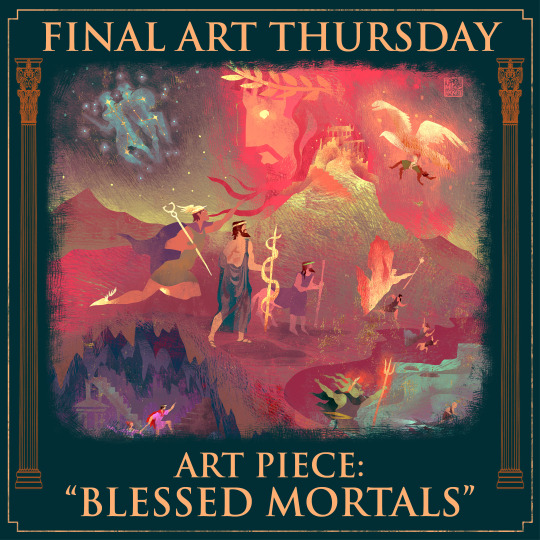

From the heights of Mount Olympus, I, Zeus, observe the mortal realm and bless those with pure hearts and noble actions, like Asclepius, Ganymede, and Semele, elevating them to divinity. Their virtues reflect the gods' benevolence, inspiring reverence through the ages.
I, Zeus, favor the Dioscuri twins, Castor and Pollux, renowned for their bond and protection of sailors. Castor, son of Tyndareus, excels in horsemanship, while Pollux, born of myself, is a skilled boxer. Despite their mixed parentage, I grant Pollux immortality and ensure his eternal companionship with Castor, immortalized as the constellation Gemini.
I, Zeus, am captivated by Ganymede’s beauty. Disguised as an eagle, I abduct him and make him the gods' cupbearer, replacing Hebe. Ganymede, now immortal, serves nectar on Olympus, embodying eternal youth and beauty.
I, Dionysus, see my mother Semele die when Zeus reveals his true form. I descend to the Underworld to plead with Hades for her release, bringing her back to life and welcoming her to Olympus as an immortal.
I, Poseidon, witness Ino and her son Melicertes escape Hera’s wrath by leaping into the sea. I transform them into sea deities, Leukothea and Palaimon, protectors of sailors. Leukothea even saves Odysseus on his journey home from Troy. I, Hermes, save Apollo's son Asclepius from the funeral pyre. Raised by the centaur Chiron, Asclepius masters healing and even resurrection, earning his place among the gods as the deity of medicine and healing.
#greekmythology#greekgods#pjo#mythology#classics#classicscommunity#myths#ancientgreece#BlessedMortals#Imaginarymythology#wholesomefantasyart#artists on tumblr
33 notes
·
View notes
Text
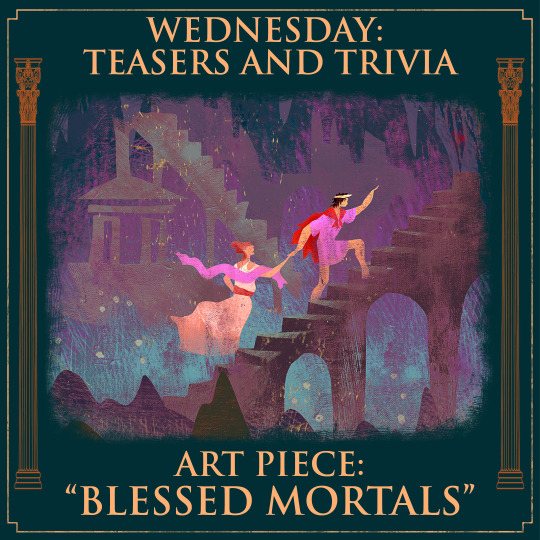
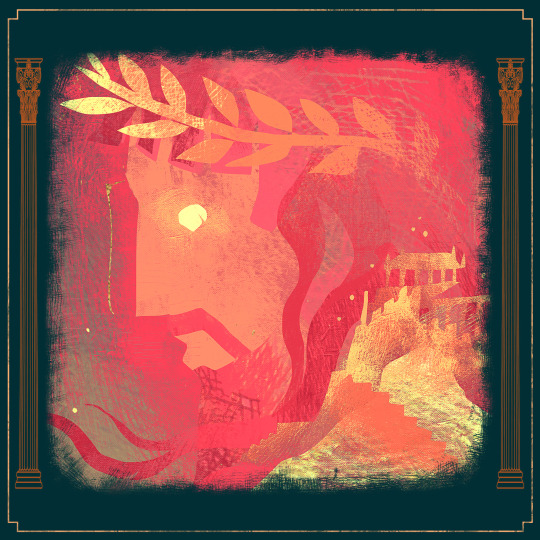
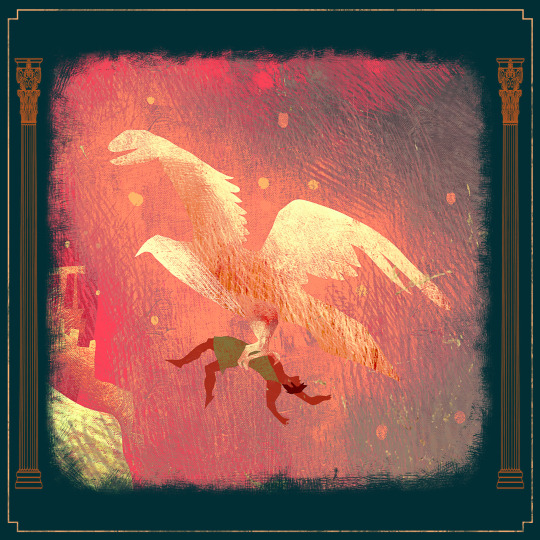
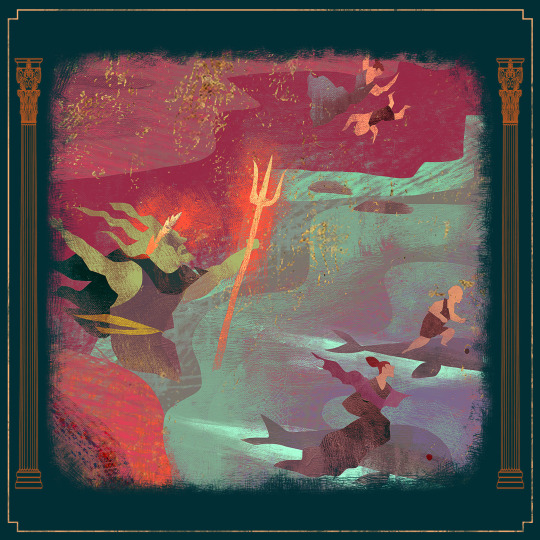
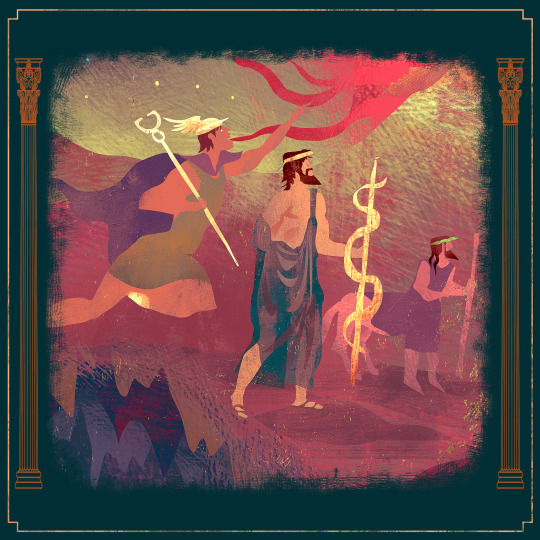
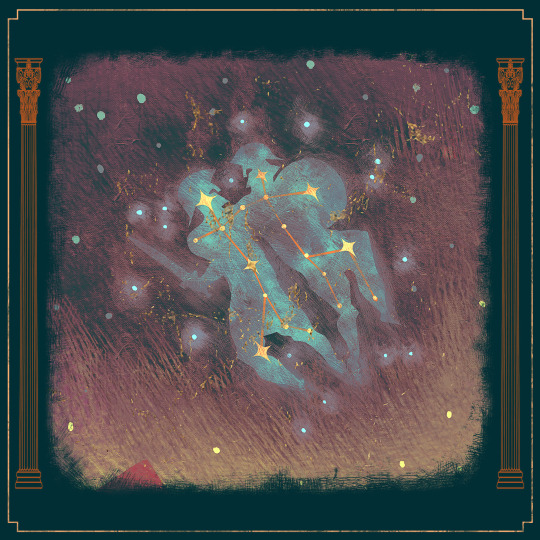
Each week we offer surprising and lesser known trivia facts about the selected mythic tale. So here we go! 7 fascinating facts you may or may not know 1. Semele's Tragic Fate: Before her transformation, Semele's excessive pride led to her demise, as she demanded to see Zeus in his full divine glory, resulting in her incineration.
2. Asclepius' Mortal Origins: Despite his divine status, Asclepius was originally a mortal son of the god Apollo and the mortal woman Coronis.
3. Asclepius' Healing Symbols: The snake wrapped around Asclepius' staff represents the cyclical nature of life and death, symbolizing the healing process.
4. Caduceus' Ancient Origins: The caduceus actually originated from ancient Mesopotamia as a symbol of peace and negotiation, not specifically associated with trade or communication.
5. Ganymede's Celestial Reward: As a reward for his service, Ganymede was placed among the stars as the constellation Aquarius.
6. Dioscuri Twins' Divine Bond: The Dioscuri twins were known for their unwavering loyalty and brotherly bond, often appearing together in myths and religious practices.
7. Leukothea's Tragic Past: Before her transformation, Leukothea was a mortal woman who was forced to sacrifice herself to save her brother from drowning.
#greekmythology#greekgods#pjo#mythology#classics#classicscommunity#myths#ancientgreece#BlessedMortals#Imaginarymythology#wholesomefantasyart#artists on tumblr
30 notes
·
View notes
Text

Book 4 continues as Hera sends Iris to request a meeting with the sea Nymph Thetis and to ask Hephaestus to cease his blasting hammers and for Aiolos to provide a favorable wind for the Argonauts. Meeting with Thetis, Hera reveals that her son, Achilles, is destined to marry Medea in the afterlife. Therefore, the sea nymphs should assist the safe passage of the Argo through the treacherous sea channel to come, passing the luring songs of the sirens, the whirlpool of Charybdis, and the multiheaded dragon Skylla.
Thetis visits Peleus in secret advising that the argonauts should set sail with divine support. The Argo ship passes by the Sirens, the half-women, half-bird creatures whose voices enchant sailors to their doom. It is by Orpheus playing his song to drown out their seductive songs, that they can escape. Next, they enter the deadly waters between Charybdis and Skylla, but the sea Nereids arrive swimming below the ship, lifting it up over rocky shores to prevent wreckage.
#greekmythology#greekgods#pjo#mythology#classics#classicscommunity#myths#ancientgreece#BlessedMortals#Imaginarymythology#wholesomefantasyart#artists on tumblr
41 notes
·
View notes
Text





The Garden of the Hesperides was a mystical paradise in the far west, guarded by nymphs and Ladon, a hundred-headed serpent. It housed golden apples of immortality, a gift from Gaia to Hera. Despite its serenity, conflict occurred when Heracles tricked Atlas to retrieve the apples. The garden symbolizes immortality, temptation, and the boundary between life and death.
Here are the five surprising facts about the "Garden of the Hesperides":
1. Mysterious Location: The garden was often said to be at the western edge of the world, with various myths placing it in different locations, such as North Africa or an island.
2. Varied Parentage: The Hesperides had different origin stories, sometimes being daughters of Nyx and Erebus, or of Zeus and Themis, adding both cosmic and earthly significance.
3. Not Always Peaceful: Though a paradise, the garden saw conflict, especially with Heracles either killing Ladon or tricking Atlas, leaving the garden in ruin.
4. Symbolism of Apples: The golden apples symbolized immortality or divine favor and were a gift from Gaia to Hera. Some believe they represent unattainable beauty or temptation.
5. Evening and Death: The Hesperides' connection to "Hesperos" (evening) linked them to the west and death, casting their paradise as a liminal space between life and death.
#greekmythology#greekgods#pjo#mythology#classics#classicscommunity#myths#ancientgreece#BlessedMortals#Imaginarymythology#wholesomefantasyart#artists on tumblr
26 notes
·
View notes
Text

Week 7: FINAL ART THURSDAY Art Piece: Art Piece: A Brother Betrayed The art is complete! After guiding you through plans, sketches, and timelapses, we proudly present the final reveal—where imagination meets the mythic at Lockett Studio.
The Colchians were nearly upon us, led by Apsyrtos, Medea’s brother. We had docked on an island dedicated to Artemis, claiming the fleece by right, but Apsyrtos demanded Medea’s return. Pulling me aside, Medea reminded me of my promise to bring her home with me. If I didn’t intend to keep it, she’d rather face death now than the fate that awaited her back in her father’s hands.
We devised a plan: lure Apsyrtos to the temple of Artemis and strike him down. There, under cover of the offering, I ambushed and killed him, burying his dismembered body. But Zeus and the Furies were furious, and as we sailed away, Zeus’s voice warned that our blood guilt must be cleansed by Circe.
At last, we arrived on her island. Circe, washing blood from her hands in the sea, invited us into her home. We knelt before her, and she made offerings to calm the gods’ wrath, our hands soaked in sacrificial blood. Leaving her house, I led a shaken Medea back to the ship, and we set off, the burden of our sins heavy but tempered by the goddess’s mercy.
#greekmythology#greekgods#pjo#mythology#classics#classicscommunity#myths#ancientgreece#LegacyOfMortals#Imaginarymythology#wholesomefantasyart#artists on tumblr#digital artist
32 notes
·
View notes
Text

The art is complete! After guiding you through plans, sketches, and timelapses, we proudly present the final reveal—where imagination meets the mythic at Lockett Studio.
The Argonauts arrive in the land of the Phaeacians, where they are welcomed with sacrificial festivities. However, the Colchian fleet arrives, demanding Medea's return. Medea pleads for protection, and the Phaeacian king and queen agree to safeguard her if she marries Jason. With their wedding solemnized, the Colchians relinquish their pursuit.
Afterward, the Argonauts are blown off course for nine days and trapped in the Libyan Sea. Stranded in a barren desert without food or water, they fall into despair, but Jason has a vision of the Hesperides, who encourage him to find strength. Inspired by a sign from Poseidon, the Argonauts lift their ship and carry it across the desert for twelve days, following a giant horse.
Eventually, they reach the garden of the Hesperides, only to find the goddesses grieving, as Herakles had slain the serpent guarding the golden apples. After refreshing themselves, the Argonauts are guided by Triton to a channel, allowing them to continue their journey.
#greekmythology#greekgods#pjo#mythology#classics#classicscommunity#myths#ancientgreece#BlessedMortals#Imaginarymythology#wholesomefantasyart#artists on tumblr
36 notes
·
View notes
Text
Timelapse Tuesday Art Piece: The Daughters of Ares
Here is my color sketch process for this week's image "The Daughters of Ares" final image coming later this week. Stay tuned for close-up teaser images to be posted tomorrow on Wednesday as well as some fun trivia facts 🤙🏛
Like this art? It will be in my illustrated book with over 130 other full page illustrations coming soon to kickstarter. Please check my links in my linktree in my bio to join the kickstarter notification page. 🤟❤🏛
#greekmythology#greekgods#pjo#mythology#classics#classicscommunity#myths#ancientgreece#BlessedMortals#Imaginarymythology#wholesomefantasyart#artists on tumblr
24 notes
·
View notes
Text





Each week we offer surprising and lesser known trivia facts about the selected mythic tale. So here we go! 5 fascinating facts you may or may not know
Dodona Planks' Ancient Origins: The Dodona planks were said to be older than the Greek civilization itself, dating back to the time of the Titans.
Orpheus' Tragic Fate: Despite his musical prowess, Orpheus' love for Eurydice led to his tragic downfall, as his failure to look back at her while escaping the underworld caused him to lose her forever.
Sirens' Musical Origins: The Sirens were originally beautiful maidens who were gifted with enchanting voices by the gods, but their arrogance and vanity led to their transformation into monstrous creatures.
Nereids' Connection to Poseidon: The Nereids were considered daughters of the sea god Poseidon, and they were often depicted as his loyal servants and companions.
Charybdis and Scylla's Mythological Significance: The encounter with Charybdis and Scylla was considered one of the most perilous challenges faced by the Argonauts, symbolizing the dangers and obstacles that heroes must overcome on their quests.
#greekmythology#greekgods#pjo#mythology#classics#classicscommunity#myths#ancientgreece#BlessedMortals#Imaginarymythology#wholesomefantasyart#artists on tumblr
24 notes
·
View notes
Text





Hi everyone! We’ve been working on a book layout design that explores the theme of Universal Truths of Greek mythology , and we’d love to hear your thoughts! This project is very close to our hearts, and we’re eager for your feedback.
What do you think about the page designs, the flow of the layout, or the way we’ve represented the core ideas? Are there any adjustments or creative suggestions you’d like to share?
come give us feedback on discord, we cant wait to hear your thoughts!
#LockettStudio#greekmythology#greekgods#pjo#mythology#classics#classicscommunity#myths#ancientgreece#Imaginarymythology#wholesomefantasyart#Discord
15 notes
·
View notes
Text





Hi everyone! We’ve been working on a book layout design that explores the theme of Universal Truths of Greek mythology , and we’d love to hear your thoughts! This project is very close to our hearts, and we’re eager for your feedback.
What do you think about the page designs, the flow of the layout, or the way we’ve represented the core ideas? Are there any adjustments or creative suggestions you’d like to share?
come give us feedback on discord, we can't wait to hear your thoughts!
#LockettStudio#greekmythology#greekgods#pjo#mythology#classics#classicscommunity#myths#ancientgreece#Imaginarymythology#wholesomefantasyart#Discord#greekmyths#artists on tumblr#pagan#greek
13 notes
·
View notes